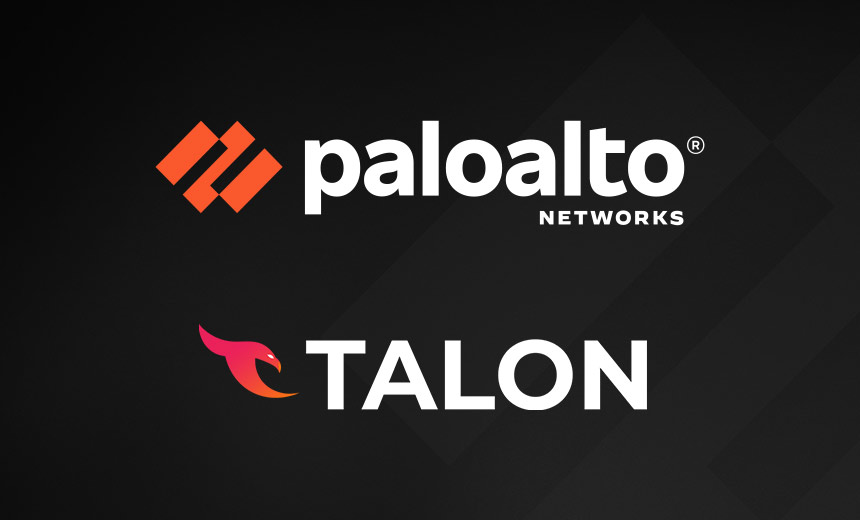[ad_1]
Governance & Risk Management
,
SASE
Talon Acquisition Will Allow Users to Securely Access Business Apps From Any Device

Palo Alto Networks announced its second acquisition in a week, scooping up the 2022 winner of RSA Conference’s prestigious Innovation Sandbox contest.
See Also: Live Webinar | Generative AI: Myths, Realities and Practical Use Cases
The Silicon Valley-based platform security behemoth said its proposed purchase of Tel Aviv, Israel-based Talon Cyber Security will enable users to securely access business applications from any device, including mobile and other noncorporate devices. Talon’s enterprise browser product will be integrated into Palo Alto Networks’ Prisma SASE platform to protect all managed and unmanaged devices.
“Integrating Talon with Prisma SASE will enable Palo Alto Networks to securely connect all users and devices to all applications, including private applications, and apply consistent security no matter who the user is and what they use for work,” Palo Alto Networks Chief Product Officer Lee Klarich said in a statement.
Terms of the acquisition weren’t disclosed, though TechCrunch and Calcalist have reported over the past day that Palo Alto Networks is slated to pay $625 million for Talon Cyber Security. Palo Alto Networks’ stock is up $1.26 – or 0.52% – to $244.79 per share in trading Monday morning, and the company didn’t immediately respond to an Information Security Media Group request for additional comment (see: Why Palo Alto Is Eyeing Secure Browser Firm Talon for $600M).
What Talon Cyber Security Brings to the Table
Talon Cyber Security was founded in February 2021, raised $143 million in two rounds of funding with backers such as CrowdStrike CEO George Kurtz, and grew its headcount by 95% over the past year to 152 workers, according to IT-Harvest. Talon CEO Ofer Ben-Noon previously led automotive cybersecurity firm Argus for eight years, and CTO Ohad Bobrov oversaw enterprise mobility at Check Point Software (see: Talon Cyber Security Raises $100M to Enhance Secure Browser).
“This is a strategic move that, once closed, will align incredible teams and technologies to execute on the vision of securing all users, from every device, that access corporate applications and data,” Ben-Noon wrote on LinkedIn on Monday. “I could not be more excited to see something the team and I helped shape and build become a part of the strategy of one of the world’s true cybersecurity leaders.”
Palo Alto Networks’ proposed purchase of Talon comes just six days after the company agreed to buy data security posture management startup Dig Security for $315 million, according to Calcalist. Dig’s offering enables companies to discover, classify, monitor and protect sensitive data across all cloud data stores, and it will be integrated into Palo Alto Networks’ Prisma Cloud platform (see: Palo Alto Networks to Buy Data Defense Startup Dig Security).
“This acquisition is simply the start of another chapter in our journey.”
– Ofer Ben-Noon, co-founder and CFO, Talon Cyber Security
Talon’s enterprise browser enables unmanaged devices to securely access enterprise apps and protects them from malware, phishing, malicious domains and keylogging, Palo Alto Senior Vice President and General Manager Anand Oswal wrote in a blog post. The firm provides data security controls natively in the browser, meaning clients can put controls in place for downloading files, copying sensitive data and taking screenshots, he said.
The company provides comprehensive visibility into work-related online activity on unmanaged devices without touching the personal usage of the device to ensure complete respect for user privacy, Oswal said. Talon also gives IT administrators and users a single sign-on integration framework on all devices and operating systems, providing a seamless user experience and reducing operational complexity.
“Talon’s Enterprise Browser empowers security teams with deep visibility and control over all work-related SaaS and web activity on all devices, including personal and unmanaged endpoints,” Oswal said in a statement. “SASE solutions must evolve to secure unmanaged devices with the same consistent security applied to managed devices so that users can securely access business applications.”
A Fork in the Road for the Enterprise Browser Market
The browser has essentially become the operating system for many workers in today’s world of SaaS applications and distributed work, Ben-Noon wrote in a blog post. Instead of surrounding the browser with security tools, he said, Talon opted to create a security platform within the browser itself to turn the browser into a solution rather than a potential vulnerability.
Giving organizations deep visibility and tight control over the browser has helped transform it into an enterprise-grade, secure workspace, according to Ben-Noon. Talon in July teamed up with Microsoft to offer a private service through Azure OpenAI that ensures the model isn’t being trained on data input from users and restricts access to less-secure generative AI services, Ben-Noon told ISMG this summer (see: Talon CEO on Bringing Security, Compliance to Generative AI).
“This acquisition is simply the start of another chapter in our journey,” Ben-Noon wrote in the blog post. “It represents a monumental, significant leap forward.”
The acquisition of Talon comes just two weeks after top competitor Island completed a $100 million Series C funding round on a $1.5 billion valuation to accelerate market penetration and sales growth. The Dallas-based enterprise browser startup said the Prysm Capital investment will make it easier for Island customers to secure bring your own device, “work from anywhere” patterns and contractor access (see: Island Raises $100M to Embrace Anomaly Detection, Go Global).
Palo Alto Networks had a 22-month dry spell in terms of major acquisitions, lasting from the company’s $156 million acquisition of cloud security startup Bridgecrew in February 2021 until the December 2022 purchase of application security firm Cider Security for $198.3 million. That’s a far cry from early 2018 to early 2021, when Palo Alto spent $3.46 billion on 12 deals during Nikesh Arora’s first few years as CEO.
[ad_2]
Source link
